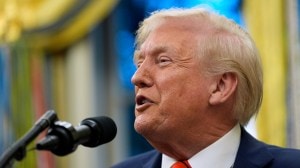Want to disclose assets…CJI cant speak for all of us: K’tka HC Judge
Justice D V Shylendra Kumar of the Karnataka HC has said that 'its a misnomer to think that the judges of the superior courts are not ready to disclose their assets.'
In the first open dissent by a sitting judge against the Chief Justice of Indias stand on declaration of assets by the higher judiciary,Justice D V Shylendra Kumar of the Karnataka High Court has said that its a misnomer to think that the judges of the superior courts are not ready to disclose their assets.
Writing in The New Indian Express today,Justice Kumar said that the most damaging and uncalled for impression (has been) created in the minds of the public that judges of superior courts,who enjoy Constitutional protection and immunity,are wary of disclosing their assets and would like to keep this information well-guarded…and also cover up a possible misdeed or a possible improper acquisition.
Referring to Chief Justice K G Balakrishnans remarks that judges could be harassed if their assets were made public,Justice Kumar has argued that on the legal plane, the CJI does not have the authority to speak for all other judges of the superior courts,whether of the Supreme Court or of High Courts,unless any of them have either confided in the Chief Justice or have authorised him to speak on behalf of others.
Speaking to The Indian Express from Bangalore this evening,Justice Kumar said: Why should there be a problem (in declaring assets)? I have said,Put my assets on the High Court website below my profile. But there is some reluctance. I am looking for a suitable site to now do so.
The Government had to withdraw the Bill on judges assets in the last session after a chrous of protest from the Opposition against the provision that a judges assets would be beyond the purview of the Right to Information Act (RTI).
Underlining how it was the Supreme Court itself that pushed RTI,the judge said that the court had upheld the high moral principle that the rule of law should operate uniformly; that the Constitution is above every one; that rights of citizens guaranteed under Article 19(l)(a) of the Constitution of India,i e,right of expression,should outweigh the personal difficulties and hardships that can be pleaded by persons occupying high positions and serving as public servants.






- 01
- 02
- 03
- 04
- 05

























